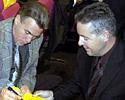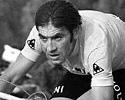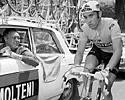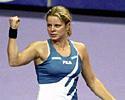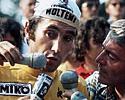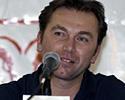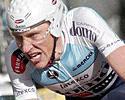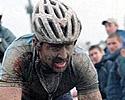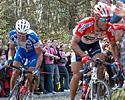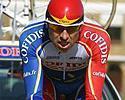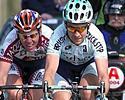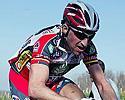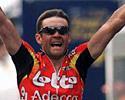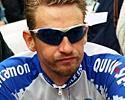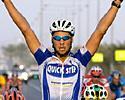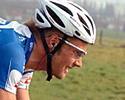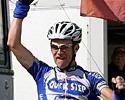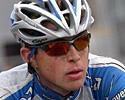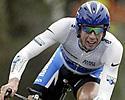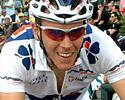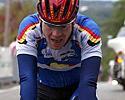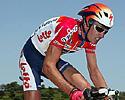News analysis, June 9 , 2005
The revival of Belgian cycling
After a few years in the doldrums since the great days of Eddy Merckx, Belgian cycling is on an upswing, with a array of young talent once more inspiring the fans of the cycling-mad nation. Gerrit Deleu looks at the riders who are restoring Belgian cycling pride.
"Name ten famous Belgians." This is a well known party game in the UK and considered one of the most challenging questions one can ask. Lately it has become slightly easier thanks to successful tennis players Kim Clijsters and Justine Henin-Hardenne, both on their way back to the top now after a fallback due to health problems. Other than them, most people get stuck after Jean-Claude Van Damme and Tintin. Cycling fans get a bit further of course, and will give you the name almost any Belgian would give you if you asked him or her about their most famous countryman: Eddy Merckx.
Merckx is an icon, symbolizing the importance of cycling in this little country in the centre of Europe. This is where the cradle of bike racing stands, and the sport has a great and long history here. Many of the longest-running races on the international calendar are Belgian, and the number of cycling champions this country has produced is completely disproportionate to its tiny population of just 10 million. Apart from perhaps Italy, there is no country in the world where cycling is this popular -0 and where its popularity continues to grow, as shown by the still-increasing number of races that are covered live on television. Last month for example, the Belgian audience could not only enjoy daily live broadcasting of Belgium's own national tour and the Giro, but also of the Tour de Romandie, well known of course among cycling fanatics but not really a major general sporting event. The Belgian public TV channel VRT is therefore very experienced in broadcasting bike races and has built up quite a reputation. The UCI has now asked VRT to organize and direct the live coverage of the team time trial in Eindhoven, a new ProTour event that the UCI wants to showcase how ProTour organization should be.
Unfortunately however, Belgian cycling has been going through a crisis in the last couple of decades. Its name and fame has become a largely historical one.
Particularly in the stage races, Belgians have completely disappeared from the podiums. The most recent Belgian victories in the big tours were Lucien Van Impe's 1976 Tour de France win; Freddy Maertens's victory in the 1977 Vuelta a Espana and Johan De Muynck's 1978 first place in the Giro d'Italia.
After 1990, only two Belgians have managed to reach the top 10 in the Tour de France: Johan Bruyneel in 1993, and Axel Merckx who finished tenth in 1998, However, that was the infamous Tour where almost half of the riders had gone home as a result of the Festina case.
All this is of course quite painful for a country that was used to a lot more. In the history of the Tour de France, Belgian riders have obtained 49 podium spots; only France itself is doing better. Belgian cycling fans have had to comfort themselves with stage victories and the fact that some of the big stage race champions of recent times are at least led to their victories by Belgian managers and directeurs sportifs: both the management of Lance Armstrong's Discovery Channel (Johan Bruyneel, Dirk Demol, and Lorenzo Lapage) and Jan Ullrich's T-Mobile (Walter Godefroot, and Rudy Pevenage) is largely Belgian.
And even in one day races, Belgian riders have hardly been able to play the prominent role they were used to. For example, the last Belgian winner in the Giro di Lombardia was Fons de Wolf in 1980. Since the year 2000, no Belgian made the top 25 in this race.
Luckily, in the great Northern races, Ronde van Vlaanderen, Gent-Wevelgem, and Paris-Roubaix, the reputation of Belgian cycling has been maintained by great champions like Johan Museeuw and Peter Van Petegem and some excellent performances from riders like Jo Planckaert, Nico Mattan, Ludo Dierckxsens, Serge Baguet and Museeuw's long time lieutenant Wilfried Peeters. But as this generation grew older, cycling fans in Belgium became increasingly worried as to what would happen when these idols would stop. Frank Vandenbroucke's win in Liège-Bastogne-Liège and second placing in the Ronde van Vlaanderen in 1999 brought about high hopes but the wonder child of Belgian cycling turned into an enfant terrible and his star sadly faded due to a combination of doping accusations, and physical and mental problems. Belgian cycling's future didn't look too bright. There seemed to be nobody else there to take over.
But now the tide seems to be turning. A promising new generation of talented young riders is standing up and showing signs that hint a possible revival of Belgian cycling. First of all, there is Tom Boonen of course, who already impressed the whole cycling world in 2002, his first year as a professional, by a 3rd place in Paris-Roubaix. Three years later, after an awesome spring classics season with wins in Harelbeke, Ronde van Vlaanderen and Paris-Roubaix, Boonen can't be called just a talent anymore. Still only 24 years old, he has already proven himself a worthy successor to Johan Museeuw as King of the Classics. Boonen is Belgium's new cycling god. He's immensely popular, with cycling aficionados but thanks to his spontaneous nature and his good looks he has also captured the attention of the broader public.
But Boonen is not alone. There's his team mate Nick Nuyens, who first showed his class with some excellent performances in Italian races last year and won the Omloop Het Volk this year. Stijn Devolder and Leif Hoste have already proven to be excellent cobblestone riders as well, resulting in contracts with Lance Armstrong's Discovery Channel.
Young Walloon Philippe Gilbert also performed at a very high level at the beginning of this season, winning the Tour du Haut-Var and finishing 6th in Milano-Sanremo. He is considered one of the greatest talents in modern cycling. Less well known is Maxime Monfort, still riding with the smaller Landbouwkrediet team. Cycling experts however regard him as one of the most promising young riders in the peloton. Monfort recently finished a nice fifth in the Tour de Luxembourg.
And maybe, just maybe, Belgium's chances are turning in stage races as well: young Davitamon rider Wim Van Huffel rode an excellent Giro, finishing 11th overall and, even more important, managed to obtain two top five spots in mountain stages. The Belgian press is all over Van Huffel these days, and that's another sign how bad it has been the last couple of years. In the old days, a performance like Van Huffel's, although very promising indeed, would have hardly drawn the attention with guys like Merckx and Van Impe around. The attention Van Huffel gets is deserved, but also dangerous: it puts a lot of pressure on him, and it wouldn't be the first time high expectations have been created that are just not realistic. In the early nineties Jim Van De Laer was designated a Tour hopeful by some journalists after some two top-30 places on the general classification. After a nice 11th spot in the 1999 Tour de France, the same happened with Kurt Van de Wouwer. Van de Laer and Van de Wouwer were of course solid riders who could climb very well but by no means GC contenders in a big Tour.
So Belgian cycling fans should be careful what we hope for, but the indicators are good that things are different this time: Van Huffel didn't earn his Giro overall classification with an early escape in a mountain stage or a big time bonus from a flat stage. He did more than just hang on in the mountain stages too: he finished in the top six three times. We saw him at the front of the maglia rosa group all the time - particularly in the stage on the Finestre, where he actually helped Savoldelli hold on to the jersey like the ideal Discovery domestique that wasn't there. And more, on the climb towards Limone Piemonte, Van Huffel even attacked on several occasions. No Belgian has managed to do that since Lucien Van Impe ended his career 25 years ago. A bit of optimism can definitely be justified this time.
We'll be looking forward to see more of Wim, starting this week in the Dauphiné Libéré!


